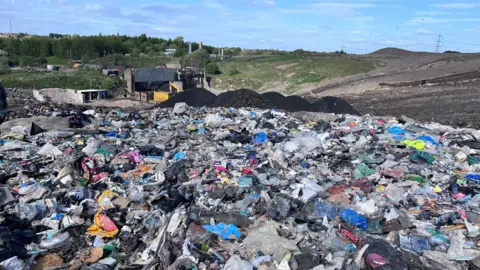Kevin KeaneScotland environment, energy and rural affairs correspondent
 BBC
BBCA ban on sending black-bag waste to landfill is effectively being delayed by two years after a BBC Scotland investigation found up to a hundred truckloads of rubbish would have to be transported to England each day.
Not enough waste incincerators have been built in time to cope with the additional waste being diverted from landfill creating a ‘capacity gap’
Ministers wrote last month to the Scottish Environment Protection Agency (Sepa) highlighting the challenges the waste industry has been facing in preparing for the ban.
Sepa has now issued a notice saying the ban will now take full effect from January 2028.
 NESS Energy Project
NESS Energy ProjectWhile the law banning biodegradable municipal waste from going to landfill will still come into effect from the end of the year, the regulator will not implement the ban as long as conditions are met.
Waste managers and landfill operators will have to apply for a six month exemption which can be renewed repeatedly until 31 December 2027.
One waste analyst described the solution as a “fudge”.
The ban applies to almost all domestic and commercial waste which has not been separated out for recycling.
The Scottish government is seeking to distance itself from the delay, saying that enforcement is an operational matter for the independent environmental regulator.
Sepa insists Scotland has made significant progress in reducing the amount of waste going to landfill and that a “pragmatic, time-limited” delay is the most responsible approach.
A spokesperson added: “In reaching this decision, we carefully considered all available evidence to ensure that residual waste is managed appropriately, in line with government policy and with the lowest possible carbon impact.”
The BBC Disclosure series revealed in June the extent of concerns within the industry about the level of preparedness for the ban.
In the first year, 600,000 tonnes of waste would have nowhere to go in Scotland because of a lack of additional capacity at incinerators.
The documentary revealed that most of that rubbish would have to be transported to England or overseas for processing if the ban came into force.
One expert said that equated to between 80 and 100 lorries crossing the border each day and there were even concerns that there wasn’t the transportation capacity to move the waste.
Alasdair Meldrum, director of waste management consultants Albion Environmental, said the delay was not unexpected as the ban was going to cause “significant disruption.”
He added: “The practical reality is that waste-to-energy, with the current rate of landfill tax, is less expensive than landfill so there will be commercial pressure on operators to use that wherever possible.”
But he warned that delays by the regulator in allowing waste to go to landfill could lead to backlogs when incinerators break down.
‘Reduce, reuse, recycle’
As well as the visual impact on communities, landfill is seen as the least environmentally sustainable way of handling waste.
It involves dumping the waste in a huge hole in the ground and covering it over with soil.
Landfill taxes have made the option progressively more expensive that incineration, where the rubbish is burnt in a furnace to create electricity.
Efforts to encourage us to recycle have barely budged the dial in Scotland, even though rates in the rest of the UK are higher – much higher for Wales.
Several new incinerators are either in planning or construction which should close the capacity gap within two years.
Longer term concerns about overcapacity at incinerators led ministers to announce in 2022 that no more would be allowed beyond those already under consideration.
Friends of the Earth Scotland has long argued that incineration should not be seen as the solution to dealing with waste and that more investment is needed in waste reduction and recycling.
Campaigner Kim Pratt added: “Rather than allowing these costly and damaging policies to continue, the Scottish government must close the loopholes in its incinerator moratorium and properly invest in the real solution to waste management: reduce, reuse and recycle.”
Disclaimer : This story is auto aggregated by a computer programme and has not been created or edited by DOWNTHENEWS. Publisher: BBC







